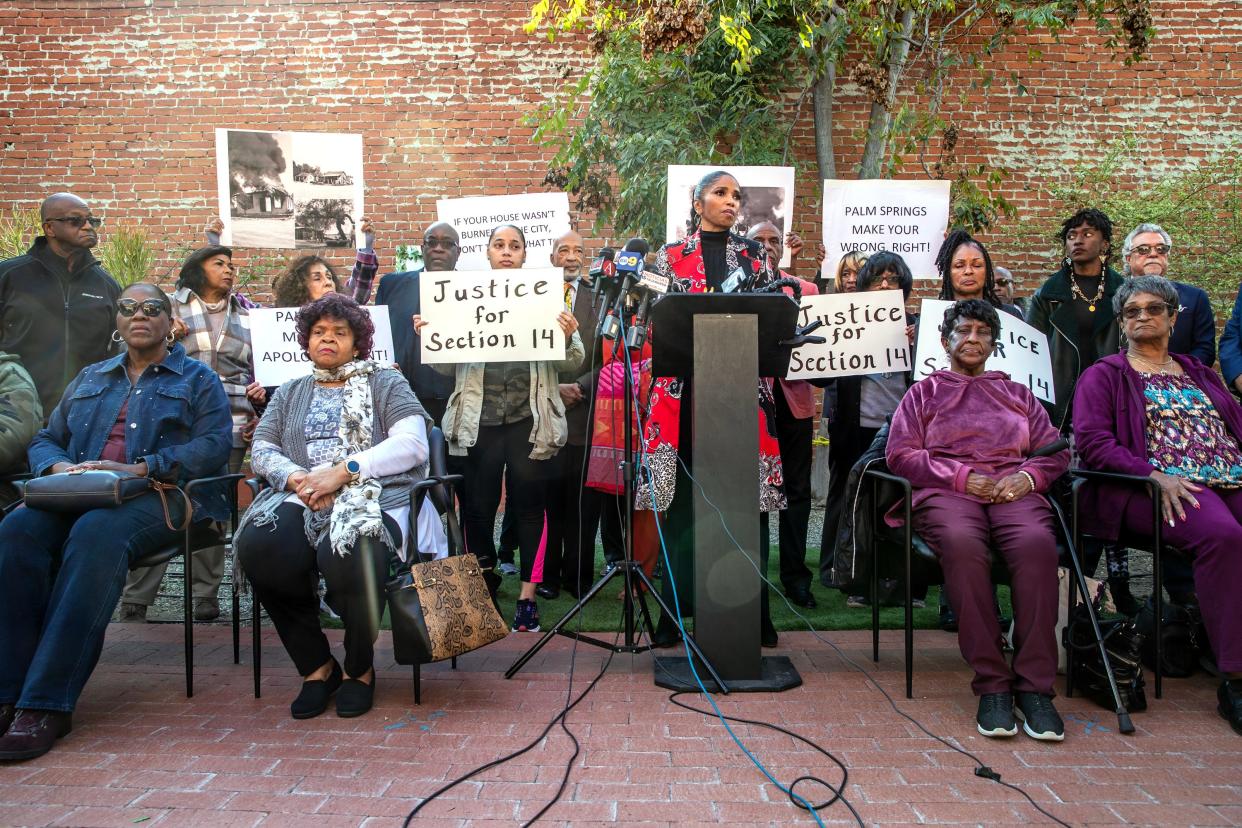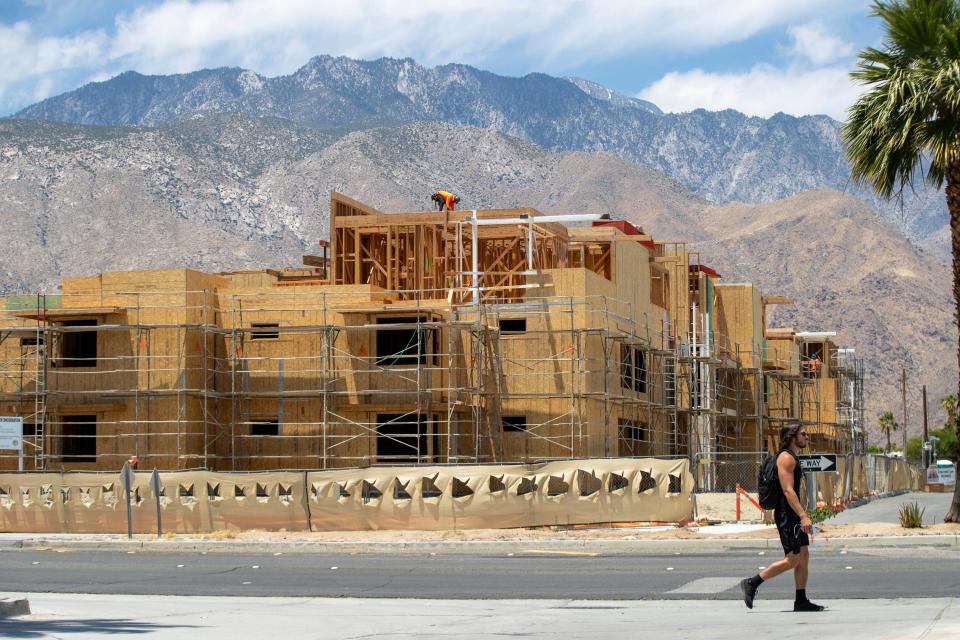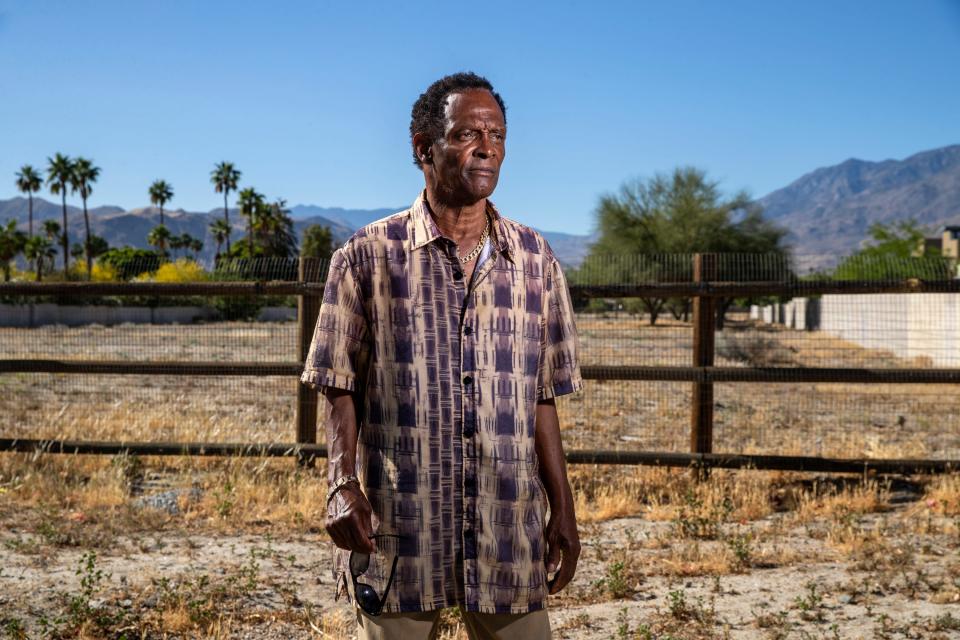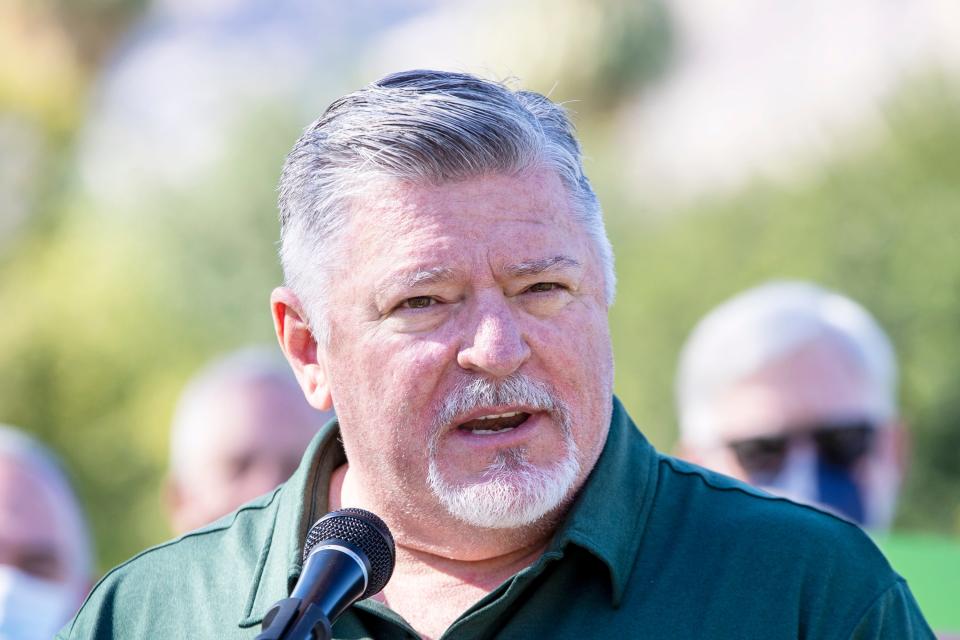After signs of hope, settlement talks stall over Palm Springs' Section 14

Months after signals of a possible settlement between the city of Palm Springs and former residents of the Section 14 area, talks appear to have stalled. That leaves open the possibility of a lawsuit against the city over a painful episode of its history whose wounds, some say, have never healed.
Late last year, it appeared momentum was gathering for the surviving residents — and descendants of others — to be compensated for what they say was their wrongful removal from their homes more than half a century ago.
At a press conference in Los Angeles, the attorney for a group calling itself Section 14 Survivors announced she was amending a previously filed claim against the city to allege the damages from decades of compounding harm caused by their removal amounted to “upwards to $2 billion." The attorney, Areva Martin, called on the city to deal with the residents and their descendants in good faith to come up with fair compensation.
At nearly the same time, then-Mayor Lisa Middleton released a statement, seemingly responding to the amended claim, that reiterated previous city apologies for the harm the city caused during the removals. Middleton said the city was aiming to make things right and would “thoroughly investigate” the history of Section 14 “as it develops remedial programs that are fair to everyone.” The next step, the city said at the time, was to be the hiring of a consultant who would both investigate the history of Section 14 and then help lead the development of a reparations program.
But one year later, no consultant has been hired and it is unclear when or if that will happen. And while the city council has repeatedly talked about the issue in closed meetings with the city's attorney, little has emerged to suggest a settlement is near.
The legal claim that's pending is not a lawsuit, but a “government claim” filed directly to the city — an action that can be the precursor to a lawsuit.
Martin, meanwhile, said there has been some dialogue between her and the city about how to resolve the claim. But she said the city hasn't made what she or her clients consider a good faith offer and added that if that doesn't happen soon, she could take the claim to court.
“In my opinion, it looks like we are making progress and we will take a couple steps forward, but then we always end up making more steps backward,” Martin said.
A spokesperson for the city, meanwhile, said it continues to communicate with Martin but had little else new to share.
What is Section 14?
The land known as Section 14 is a square mile east of downtown owned by the Agua Caliente Band of Cahuilla Indians and its members. For decades, it was home to many people of color, who either rented homes or built their own on land that was either formally or informally leased because racist housing policies denied them the ability to buy homes elsewhere in the city.
Beginning in the early 1950s, some homes in the area were condemned and demolished for violating state health and sanitation standards.
And when changes in federal law allowed longer leases on tribal land, the tribe sought to redevelop the area, which now includes a tribe-owned casino and resort. The city led many of the evictions, as well as the destruction of condemned homes, with a city firefighter lighting a match in at least one case.
Many residents reported that they were given little or no notice before their homes were burned. But other people, including some former city leaders, say the record shows that residents were given adequate notice, including all notice required by law, and the city made at least some efforts to find places for the residents to relocate to.
They also point out that those who lived on the land were merely renting it from the tribe, whose right to the land had previously been wrongly limited and which was now able to realize the full value of the land by opening it up to redevelopment.
What have the two sides proposed?
Martin said she has made proposals to the city attorney to resolve the claim. She declined to share the full details, but said they included having the city help fund the construction of a cultural center and a racial healing center, which could be located together or separately.
She said the group envisions a racial healing center as a place where people can come together and address racial conflict and strife. The cultural center, meanwhile, would be a “destination” that would include elements of a museum, with artifacts and displays telling the story of the Section 14 period and displacements, but also spaces for presentations, performances, classes and other events related to racial justice. She cited the Skirball Cultural Center in Los Angeles, a multifaceted facility dedicated to both the lives and culture of Jewish people and the exploration of themes related to social justice and human rights, as exemplifying what her group has in mind.
Martin said such a center would serve several purposes, including telling an accurate history of Section 14 and memorializing and honoring those removed from their homes. However, she said it would also generate revenue for the city, which could be used to help compensate her clients.
When asked how much money she thought the centers could generate, Martin said that while she could not point to a specific figure, her research into similar facilities suggests it could be "substantial.” She said the city should begin to plan that kind of cultural center instead of hiring someone to research the history of Section 14 as it has planned.
“Wouldn’t that be a much better investment for the city?” she said.
However, Martin said the city has not shown much interest in her proposals and has repeatedly pointed to ongoing construction of affordable housing apartment complexes on the north side of Palm Springs as part of a settlement.

But Martin said that while her clients support the construction of new affordable housing in the city, they don't view the city living up to its pre-existing commitment to do so as any basis for resolving the Section 14 claim. Among the reasons, she said, is that most of the Section 14 residents and descendants no longer live in Palm Springs.
“The reality is that they could build that housing on the north end and not a single (Section 14) survivor would end up living in it,” she said.
‘It doesn’t work that way’
While the Section 14 group does want housing as part of a settlement, Martin said it would be furthering the legacy of discrimination for that housing to be located only on the poorer north end of the city. She said that while any settlement should include housing, her clients should be consulted about what form that housing should take and where it should be built.
“The perpetrator doesn’t get to decide what the remedy is for the harm that it has caused,” she said. “You don’t get to tell us we are going to build 10 buildings on the north end and that’s your restitution. It doesn’t work that way.”

Martin said the city has also repeatedly invoked the need to develop any reparations process in an open and public way, guided by some kind of expert. She said her clients originally supported that idea, but believe the city council's divided vote in April not to hire a reparations consultant recommended by city staff show that intention was not sincere. A majority of council members said that before they make any decision on reparations, they want to gather impartial information on the history of Section 14, a step Martin said is unnecessary.
When The Desert Sun asked city spokesperson Amy Blaisdell in late October if the city could provide any update on discussions around the claim, Blaisdell responded that “there is no update at this time.”
Since the claim was filed in November 2022, the city council has repeatedly discussed it with City Attorney Jeffrey Ballinger in closed session. That's allowed under the state open-meetings law because it is a legal matter that could involve liability for the city.
Most recently, on Oct. 12, the council spent about 30 minutes discussing the matter in closed session before its regular public meeting and then continued the closed session for an additional 15 minutes afterward. At the end of the session, Ballinger said there was no reportable action from the meeting, as he has every time the issue has been discussed during closed session.
Is the city still looking for a reparations consultant?
The request for proposals for potential reparations consultants posted online in November 2022 stated that the city was projecting to award a contract in January 2023. The consulting work would then take a year.
In April, the team of city staff members that were given the task of vetting the proposals recommended the city hire a four-person team that would be overseen by Columbia University. That team was led by a Columbia University professor who heads an organization that states its purpose as “promoting reparation efforts to address historical racial injustice.”
However, the city council voted 3-2 to not hire the group after multiple council members expressed concern that the group would be unable to provide an objective account of what happened with Section 14 and the city’s role in it because the professor and other members of the group advocate for reparations.
The council majority instead directed city staff to create a new request for proposals seeking someone who can objectively and comprehensively research the history of Section 14. They also asked for the new request for proposals to be brought to the council for its pre-approval.
To date, that has not happened. In late June, Blaisdell told The Desert Sun that staff hoped to have an RFP ready to bring before the council by late summer.
Asked for an update prior to the council's Oct. 12 closed-door discussion on the legal claim, Blaisdell said Ballinger “informs that the city has been in regular communication with the Section 14 claimants through their attorney. The city is evaluating the role of an RFP in the context of those discussions. The city is hopeful those discussions will soon result in a process for verifying the historical context of the Section 14 displacements.”
What comes next?
Martin said her clients remain willing to participate in a process guided by a consultant so long as that person is a recognized expert in the field of reparations and is hired with a clear understanding that their job is to develop a program for compensating her clients — a description Martin said applied to the Columbia University team.
However, she said her group is strongly opposed to the more recent intention expressed by the city to hire an expert to research the history of Section 14. In her clients’ minds, that history and the city’s culpability have been clearly laid out in both a 1968 report by the California attorney general's office and a 2021 report from the city’s human rights commission.
Current City Councilmember Ron deHarte was the president of that commission when the report was written and released. He was also among the council majority that voted against hiring the consultant and said during the April meeting that before making a decision on compensation, the city first needed to identify “the depth of the harm and the individuals that were harmed specifically.”

Martin said the 1968 and 2021 reports were repeatedly cited when the city council voted to remove the statue of former Mayor Frank Bogert over his alleged role in the Section 14 removals. So it now feels wrong, Martin added, for the city to suggest more research and verification are needed, especially given that the council has publicly apologized on multiple occasions for the city’s role in the evictions.
“It's like expert shopping now,” she said. “Your expert has already verified the facts. Now, if you don't like those facts, I'm sorry, but you don't get to go out and hire someone to come up with an alternative set of facts.”
Martin said she has made it clear to Ballinger that her clients are not going to participate in a “generic fact-finding history project.”
“To me, this is like a high school history project,” she said. “We already have the facts.”
When asked if it was possible she could eventually file a lawsuit on behalf of her clients against the city, Martin responded "absolutely."
When could that lawsuit come? Martin said she was not ready to share a date publicly, but that she and her clients are thinking strategically about when to do so if satisfactory progress has not been achieved.
A potential lawsuit, however, isn't the only event on the horizon that could upend the reparations talks if they don't come to a resolution soon.
There is now less than a year to go until the 2024 election, which will likely reshape the city council. One seat up for election is now occupied by Christy Holstege, who has joined with Grace Garner to be the Section 14 group's most fervent supporters on the council. Middleton's seat is also up in 2024, and she and Holstege are expected to leave the council and run for the state senate and assembly, respectively.
The 2022 election saw two candidates run who were critical of the city's promise to provide reparations with one, Renee Brown, saying she was outright opposed and that claims of Martin's clients were not factually supported.
While both candidates lost (one by just 64 votes), the 2024 races will take place two years in later in different council districts. No one has announced a campaign, adding a major dose of uncertainty about whether the council's makeup could affect the decisions it makes on Section 14.
Paul Albani-Burgio covers breaking news and the city of Palm Springs. Follow him on Twitter at @albaniburgiop and email him at paul.albani-burgio@desertsun.com.
This article originally appeared on Palm Springs Desert Sun: Settlement appears far off on Section 14 reparations in Palm Springs

